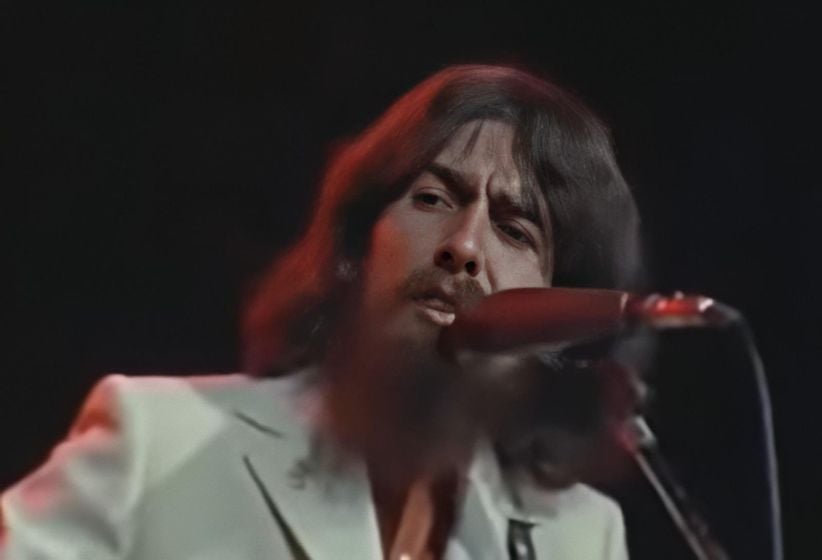Back in 1971, George Harrison was behind one of the largest gestures of goodwill that a rock star is ever likely to give, and with it, he set the tone for benefit concerts across the musical world. Below we’re taking a look back at The Beatles and his Concert For Bangladesh.
It was a huge moment for Harrison personally, and globally, the gig was in aid of Bangladesh a country whose residents had become victims of famine and war. The concert would feature an all-star line up of Bob Dylan, Ringo Starr, Leon Russell, Billy Preston, Eric Clapton, Klaus Voorman, Badfinger, and, of course, Ravi Shankar.
Harrison enlisted, as the Fab Four song would instruct, with the help of his friends to pave the way for large scale charity concerts in the future but it wasn’t all smooth sailing. Harrison had originally intended to reunite with his former bandmates for the night and provide concert-goers with the first live performance from The Beatles in America since 1966, a reason to buy the ticket, and a guaranteed surge in record sales. But it wasn’t to be.
It did nearly happen, except for one particular Beatle. John Lennon had originally agreed to appear at the gig, even consenting to Harrison’s stipulation that Lennon’s wife Yoko Ono could not perform alongside him, as had now become customary. But just a few days before the event Lennon left New York City in a cloud of contempt as he and Ono fell out over the singer’s agreement with his former bandmate.
Next on the list was Paul McCartney. Macca almost outright refused to be a part of the benefit as he was still emotionally embroiled in the group’s disbandment and the nasty legal battles that went along with them. He would later tell Rolling Stone about the opportunity to reunite The Beatles “George came up and asked if I wanted to play Bangladesh and I thought, blimey, what’s the point?”
It appeared for Macca, the timing wasn’t right: “We’re just broken up and we’re joining up again? It just seemed a bit crazy”. At least there was Ringo to the rescue. The Beatles drummer, ever-filled with peace and love, was more than happy to perform at the charity show and was ready and raring to go in time for curtain up.
One more notable name on a line-up which included the freewheeling Bob Dylan and bonafide Guitar God Eric Clapton was the inclusion of Indian musician Ravi Shankar.
The musician was famed for his command of the traditional Indian instrument the sitar and had inspired Harrison on more than one occasion to infuse his work with Eastern spirituality and musical chops. He was also inspirational when it came to ‘The Concert for Bangladesh’, when asked by a reporter as to why Harrison should put on a gig for the aid of Bangladesh he replied: “Because I was asked by a friend if I would help, you know, that’s all”.
Shankar would go on to open the evening’s proceedings, with the sitarist demonstrating the traditional instrument with a gleeful exuberance. Following Shankar leaving the stage it was time for the supergroup to arrive. They did so with Eric Clapton on guitar, Ringo Starr on drums, Leon Russell on keys and members of Badfinger on guitar and vocals, all led by the newly crowned star of The Beatles, George Harrison.
Harrison had released his mammoth genre-bending album All Things Must Pass to critical and commercial acclaim, seemingly grabbing the mood of the nation as the end of the sixties promoted a reconciliation with the two ends of the global spectrum.
The band played through a few of Harrison’s hits including a couple of Beatles songs for good measure to rapturous applause. Harrison would then nonchalantly introduce his next guest. “I’d like to bring on a friend of us all, Mr Bob Dylan”.
The event came at a very odd time for Dylan, the singer was firmly in his reclusive stage and this was his first live show since his iconic performance at the Isle of Wight Festival in 1969. But Dylan did not disappoint. The singer provided fans with his classic songs ‘Blowin’ in the Wind’, ‘Just Like A Woman’, and ‘Mr. Tambourine’ all backed by Harrison’s all-star supergroup.
The concert would go on to raise nearly a quarter of a million dollars which was given to UNICEF to administer as they saw fit.
Though by 1985 the Los Angeles Times reported that the final figure from books, CDs etc. amounted to nearly $12 million dollars being sent to help with the Bangladeshi people. Sadly, much of the money was tied up in an Internal Revenue Service escrow account for over a decade as the organisers had not applied for tax-free status on the money.
The concert and it’s recording is still to this day amassing money for the George Harrison Fund for UNICEF. The triple album release that immediately followed the event in the seventies hit No.1 in the UK and No.2 in the US and received the Grammy award for Album of the Year. After the gig, Bob and George made their way back to Dylan’s house in Woodstock and contemplated their work.
To us, it remains one of George Harrison’s crowning achievements, to be a rock star is all well a good, but to be a rock star that recognises how futile being a rock star is without human compassion can be, is surely the Holy Grail?
George Harrison, the greatest Beatle?



